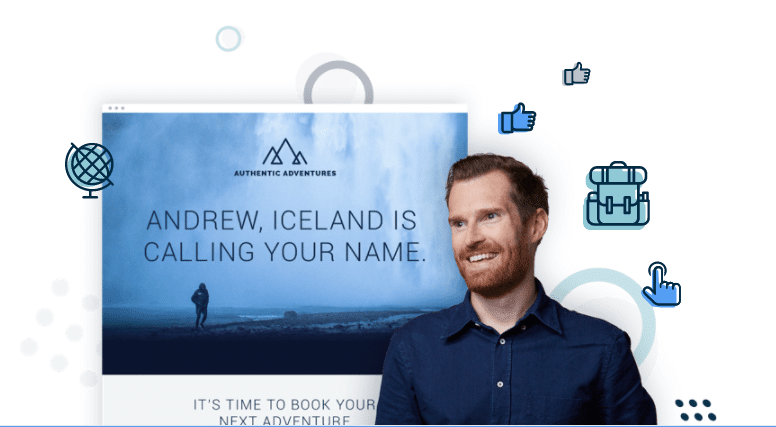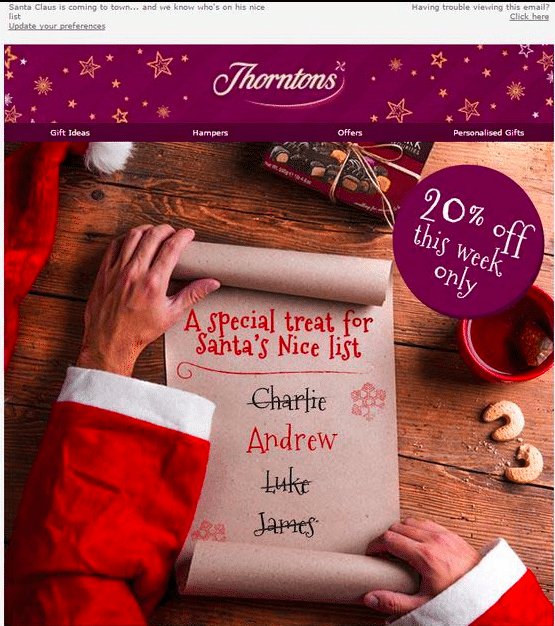Originally published November 2017, and updated December 2018.
The journey to becoming an email marketer is not a simple one. Developing the right strategy for your brand is nuanced. Plus, you have to learn how to use the ever-evolving technology available for today’s marketers and decide how to make the most of it.
We’ve come a long way from getting online to the sound of “You’ve Got Mail,?” yet email marketing is as important now (if not even more so) as it was then. You need email marketing to create and maintain lasting relationships with your subscribers.
As email marketers, we are the voice of our brand to those who have chosen to hear our message. We want to nurture our subscribers’ journeys effectively. We want to build relationships, help keep our brands top of mind, and ultimately help our companies make more sales.
Let’s dig into five lessons you learn when you become an email marketer.
1. How to choose the right ESP
To harness all of the ever-changing email marketing features available today, you need an email service provider (ESP) that provides you with everything you need to fully optimize your email strategy.
The wrong ESP may make it tough to run high-performing campaigns. Without advanced features like transactional emails, dynamic content, and customer journeys, you’ll have trouble effectively reaching your subscribers and customers.
Here are examples of high-level features you can utilize to grow your email marketing ROI:
- Drag-and-drop email builders
- 1:1 behavioral automation
- Send time optimization
- Insights and analytics
- List segmentation
- Personalized journeys
- Personalized content

2. How to ask for permission
There is a thin line that divides effective email marketing from spam. If you head into your spam folder, you might find dozens of emails that you are not interested in receiving.
Email marketing delivers the highest ROI for marketers at $44 for every $1 spent, but can easily become spam if your subscribers don’t want to receive what you are sending. This is why asking for permission is a crucial piece of the email marketing puzzle.
Make sure your list has opted-in to receiving your emails, and offer an easy-to-find unsubscribe option in your emails to keep from being exiled to the spam folder.
Optimizing your opt-in page is an effective method to find out exactly what your readers want to receive. Opt-in forms are best kept simple and easy to fill out. 4 elements a good opt-in form should include are:
- Headline – Grabs attention
- Benefits – Build trust by showing why your content is worth subscribing to
- Call-to-action – What you want the person to do
- Email entry form – collect the information you need
On May 25, 2018, the General Data Protection Regulation (GDPR) was adopted by the European Union, making it more important than ever to clarify your intentions regarding personal data and make sure you’re following the new regulations.
3. How to keep your integrity
The people on the other side of your emails likely want and expect exactly what you promised them when they subscribed. It can be counterproductive to send your list an email every two days when you promised them one per week, this is also unethical and will likely produce unsubscribes and even reports of spam.
Upholding email marketing integrity not only includes giving your readers what they have signed up for but also providing a clear and trustworthy unsubscribe process. Not doing so raises your chances of ending up in their spam boxes.
Customize your permission reminder
Your readers may not remember why they are receiving your emails. A great way to remind them why is to tell them directly in the email footer.
For every specific list, remind your readers exactly why they are receiving the email. Don’t be afraid to show a bit of personality in this area of your email. Just because you are talking permission doesn’t mean you have to be bone dry.

Use a preference center
If you are giving what you promised but still experiencing unsubscribes, a great way to maintain a solid relationship with your audience and customers is to offer a visible link to their preference center.
A preference center offers your readers the option to customize/change which messages they would like to receive instead of unsubscribing altogether. Collecting preference data is a great way to keep your email marketing integrity and connect your readers with the messages they want to receive.
Using a preference center, your readers can find out what they are signed up for. They can also customize things like:
- Desired topics
- Desired location
- Change in email address
- How often they will receive email

4. How to personalize your email messages
Gone are the days where you send the same email to your entire list.
Using the technology provided by today’s ESPs, we can make our messages more relevant than ever before. Through personalization and segmenting your list, you can boost your email marketing strategy and improve your metrics.
Get personal
It is an exciting time for email marketers, as we are now able to make our messages personalized for the specific person on the other end. Personalized email messages improve click-through rates by an average of 14% and conversions by 10%. Personalization is a crucial aspect to focus on as you journey into effective email marketing.
There are many levels of personalization. From inserting names in subject lines to changing the content of the email based on subscriber data, there are numerous ways to create an email specific to the receiver.
- Different ways to personalize include:
- Using subscriber’s location and give tips/suggestions
- Adding subscriber’s name to an image
- Basing email content on subscriber’s behavior
- Optimizing send time based on where the subscriber lives

Segment your list
Segmenting, or categorizing your subscribers into specific groups, can help you send targeted and specific messages. Marketers have found a 760% increase in email revenue from segmented campaigns. Seriously. Send your subscriber a relevant message, and they are much more likely to act… segmented campaigns work.
Using an ESP like Campaign Monitor, you can easily segment your list into groups based on categories like:
- Geographics (country, city, language)
- Demographics (gender, occupation, age)
- Psychographics (interests, activities, values)
- Behavioral (purchase history, lifecycle stage, engagement or disengagement with previous emails)

Consider the device your audience is using
As mobile phones continue to be our primary use of online access, it’s important to format your emails in a mobile-responsive style to ensure all of your customers can view your message.
5. How to spice up your subject lines ?
Where words fail, emoji speak ?

We can use emoji to convey emotion and make our email stand out. If done tastefully, emoji can add enticing pizzaz to your subject lines and make a memorable impression.
If a picture is worth a thousand words, so is an emoji: 56% of brands using emoji in their subject lines had a higher unique open rate. Emoji are an engaging addition to your subject line that packs a ton of meaning into one character of space.
If you are not sure if adding emoji to your email marketing fits your tone, message, and audience, A/B test to see how your readers react.

Here are some considerations to make when using emoji in subject lines:
- Does the emoji fit my message?
- Does my audience respond positively to emoji?
- Does this emoji render across different email clients?
- Does my subject line make sense with and without the emoji (in case emoji doesn’t render)?
Wrap up
The road to becoming an email marketer is unique for each of us. It requires understanding your subscribers, communicating your brand, and utilizing all of the helpful technology available to create high-performing email campaigns. The lessons above are examples of things each email marketer learns when they begin creating their unique strategy.
SaveSave
SaveSave
SaveSave
SaveSave





